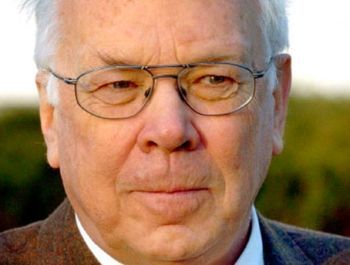
Publisher:
Bonnie King
CONTACT:
Newsroom@Salem-news.com
Advertising:
Adsales@Salem-news.com

~Truth~
~Justice~
~Peace~
TJP
May-16-2009 08:56

 TweetFollow @OregonNews
TweetFollow @OregonNews
A Liberal/Conservative Convergence
Commentary by Daniel Johnson Salem-News.comAn outcome on which liberals and conservatives can agree? You decide.
 Adolf Merckle was one of the top 100 wealthiest men alive but his finances crashed and he committed suicide in January 2009 Courtesy: sueddeutsche.de |
(CALGARY, Alberta) - Introduction
This essay is based on a true story. It’s about a couple I will call Bob and Alice.
The global economic contraction has affected everyone, rich and poor alike—albeit in different ways. Money doesn’t buy happiness, goes the old joke. Is the man with $10 million happier than the man with only $9 million?
Forbes magazine tracks the world’s richest people. Of last year's 1,125 billionaires, 355 from 40 countries dropped off because of falling fortunes. Those who fell off the list were still billions or at least hundreds of millions ahead of the rest of us.
 Section of train track where Mr. |
German businessman Adolf Merckle, 74, was one of the world’s 100 richest men, but when the economic crash decimated his business empire, he committed suicide in January 2009.
"The distress to firms caused by the financial crisis and the related uncertainties of recent weeks, along with the helplessness of no longer being able to act, broke the passionate family businessman, and he ended his life," said the family statement. He would still have been a centi-millionaire, but evidently the psychic loss was too much—a man truly made unhappy by the loss of money.
Going down the economic ladder from the super rich to the merely well off we come to Steve and Andrea Diamond. Steve Diamond has a master’s degree in actuarial science and is a Fellow of the Society of Actuaries. For 30 years he was highly successful as an actuary overseeing Fortune 500 companies’ pension plans. Applying his training and experience to his family finances, he was able to retire in 2004 at age 55.
Before his retirement, he said, “I spent a couple of weeks constructing a financial model to demonstrate whether we could live on the assets we’d accumulated. And we could. I looked at a number of different sets of assumptions I thought were reasonably conservative and sensible,” he explained. “I factored in inflation and the possibility of an underperforming market.”
When the nation’s economy collapsed in the fall of 2008, Mr. Diamond’s financial model went with it. At 60, Mr. Diamond is looking for another actuarial job.
His wife, Andrea, has a master’s degree in library science but was able to stay at home and raise their three boys, aged 17 to 24. Now, at 55, she works at a part-time library position and is seeking full-time work. Matt, 24, graduated last year with a five-year dual degree from Johns Hopkins University and its Peabody Conservatory. Jeremy, 22, graduated this spring with a communications degree with honors from American University. Ethan, 17, is a high school junior.
The two oldest boys are also unemployed and living with their parents. “If we don’t find employment, either we have to lower our cash outflow or die young, ” says Steve Diamond, adding that, “I have a fair degree of confidence, but it’s not unshakeable confidence. At the end of the day we can sell the house and move to a place where the cost of living’s not like northern New Jersey. We’re not going to starve; that won’t happen. Intellectually, I know that. But emotionally this last year is the most stressful of my life. Some nights I can’t sleep. My weight is up. It’s affected my health.”
In his memoir The Winter Years, James H. Gray recounts that in 1931 he applied for public relief in Winnipeg on the Canadian prairies.
At home were my wife and daughter, and my mother, father, and two younger brothers. Applying for relief might prove the most humiliating experience of my life (it did); but it had to be done, and I had to do it. The deep-down realization that I had nobody to blame but myself made the journey doubly difficult. (emphasis added)
He was one of millions of victims of the Great Depression but, in keeping with our society’s dominant illusion of individual responsibility, he felt personally responsible for his plight. While history doesn’t actually repeat, some themes remain constant and are acted out generation after generation within the context of evolving social worlds. We have, today, millions of people in similar despair and blaming themselves.
Steve Diamond, too, feels he is responsible for his family’s plight. “I feel bad about Andrea having to go back to work. If I had a job, none of this would be going on.” (emphasis added)
Continuing down the economic ladder we reach members of the upper middle class, like Mark Cooper of Tempe, Az., who fell from being the security manager for the western United States for a Fortune 500 company, overseeing a budget of $1.2 million and earning about $70,000 a year, to a $12/hour job as a janitor.
Ame Arlt, 53, and divorced, had been vice president of brand development at the On Command Video Corporation, making $165,000 a year when she decided to quit and open her own business in 2001. Now with her business out of business, her new job at HometownQuotes pays $10 to $15 an hour and mostly has her doing data entry. She recently cashed in the last $17,000 of her retirement savings.
John Eller, 51, of Lee’s Summit, Mo., had been a senior director at Sprint, earning $150,000 a year overseeing 7,000 employees at 13 call centers, before being laid off in 2002.
A year later, he found another job, at about half the pay, managing a call center in New Jersey. He lost that job two years later in a downsizing, A year later he landed a contract position running two call centers in Kansas and Illinois, earning close to six figures. When that ended after about a year he took a job for $10 an hour as a baker in a grocery store. He was laid off again in October 2008. He next found a job working as a supervisor on the overnight shift for a contractor processing immigration applications for the federal government at a salary of about $34,000 a year. But with eight children and a wife to support, Mr. Eller said he was still “below poverty level.”
A liberal/conservative convergence?
The most influential economics book of the 20th century was John Maynard Keynes’ 1936 General Theory of Employment Interest and Money. In it he wrote:
“The outstanding faults of the economic society in which we live are its failure to provide for full employment and its arbitrary and inequitable distribution of wealth and incomes.”
He was speaking of the economic society of the 1930s. It’s not significantly different today. In terms of economic disparity, the gap between rich and poor is, today, about the same as it was in 1929. Keynesianism added some backstops to society like unemployment insurance and welfare but people who are turfed through no fault of their own find themselves largely unsupported by the society at large.
Bob and Alice (not their real names) have found their own solution within the turmoil.
They are both in their late fifties, unemployed and not likely to find work in the foreseeable future, if, perhaps, ever again except perhaps as a Wal-Mart greeter. Bob says, half-jokingly, that he would commit suicide before becoming a Wal-Mart greeter.
They got rid of their car months ago and are often just one disconnection notice away from losing electricity, heat, telephone, or internet. Paying the rent is a continuing crisis. They do receive what in Alberta is called Income Support (a new name for what use to be called Welfare, what used to be called Relief, and in the UK is called the Dole). But, despite all these pressures, behind their apartment door they live like royalty—sort of.
Bob made it clear that their financial situation was not something of their own creation. Like 300 million others across the continent, they are victims of policies and decisions made by those in putative charge of the national and global economy. But they refuse to be victimized and have turned to an unlikely religious source for a contemporary strategy.
The 13th century Roman Catholic Saint Thomas Aquinas argued in Summa Theologica that private property is a public trust. “Whatever some people possess in superabundance is due by natural law to the purpose of succoring the poor” concluding that “if there is no other remedy it is lawful for a man to succor his own need by means of another’s property by taking it either openly or secretly.”
Two or three times a week, Bob and Alice go shopping. They asked me to reveal no details about their technique, but they have it down to a science and have been living this way for more than a year. They “shop” at two national chains and are able to get everything they need from those two chains—food, toiletries, paper goods. So, at home they live and eat comfortably. If they are taking a risk, they feel, why not eat only the finest cuts of meat and the most expensive organically grown vegetables? The only items they cannot get this way are alcoholic, but, says Alice, who needs to drink? Needing a new barbeque this spring, they loaded a new one onto a shopping cart and, unchallenged, rolled it out the door. They don’t see this as a “permanent” way of life but, if there is no work…so be it.
Corporate America is already indirectly supporting this approach. “Angry” advertising is starting to appear, in attempts to channel the feelings of frustration and fear that consumers have. Kodak, Harley Davidson and Miller beer are just three who have already produced angry ads. Jim Nelson is the chief creative officer at Carmichael Lynch in Minneapolis, the Interpublic Group agency that creates ads for Harley-Davidson. He says that an “unconventional, rebellious tone, that ‘I’m going to live my life no matter what,’ is something a lot of people could relate to.” Bob and Alice certainly think this way, but without the anger.
I call Bob and Alice’s approach the Aquinas solution.
Conservative law professor John O. McGinnis has written in The National Review that
“The depiction of our species that is emerging from Darwinism—as composed of individuals who are basically self-interested yet capable of altruism toward family and friends; who are unequal in their abilities yet remarkably similar in their aspirations—comports with fundamental premises of conservative thought.”
Conservatism is returning to its modern roots in Social Darwinism in advocating that, for survival, it’s every man for himself!
I call this the McGinnis solution.
Ninety-seven years before Darwin published his Origin of Species, the French philosopher Jean-Jacques Rousseau published The Social Contract, one of the most influence books of the last five hundred years. He wrote that “there is undoubtedly a universal justice which springs from reason alone, but if that justice is to be admitted among men it must be reciprocal. Humanly speaking, the laws of natural justice, lacking any natural sanction, are unavailing among men. In fact, such laws merely benefit the wicked and injure the just, since the just respect this while others do not do so in return.”
This is reflected in the angry advertising. Consumers, says Marc Brownstein, president and CEO at the Brownstein Group advertising agency in Philadelphia are “a little beat up and their wallets are lighter, and the people they trusted stole from them,”. Corporate malfeasance is rampant in the world today and goes largely unchallenged and unpunished.
There is a convergence here between liberalism and conservatism. Liberals believe that we’re all in this together and implicitly believe in a natural justice, even if they haven’t consciously recognized that assumption. The Aquinas solution fits this philosophy.
On the other hand, conservatives believe in an every-man-for-himself credo—the McGinnis solution.
Bob and Alice, if they were to philosophize while they shopped, could justify their lifestyle from either the conservative or liberal orientation.
 Daniel Johnson was born near the midpoint of the twentieth century in Calgary, Alberta. In his teens he knew he was going to be a writer, which is why he was one of only a handful of boys in his high school typing class—a skill he knew was going to be necessary. He defines himself as a social reformer, not a left winger, the latter being an ideological label which, he says, is why he is not an ideologue. From 1975 to 1981 he was reporter, photographer, then editor of the weekly Airdrie Echo. For more than ten years after that he worked with Peter C. Newman, Canada’s top business writer (notably a series of books, The Canadian Establishment). Through this period Daniel also did some national radio and TV broadcasting. He gave up journalism in the early 1980s because he had no interest in being a hack writer for the mainstream media and became a software developer and programmer. He retired from computers last year and is now back to doing what he loves—writing and trying to make the world a better place
Daniel Johnson was born near the midpoint of the twentieth century in Calgary, Alberta. In his teens he knew he was going to be a writer, which is why he was one of only a handful of boys in his high school typing class—a skill he knew was going to be necessary. He defines himself as a social reformer, not a left winger, the latter being an ideological label which, he says, is why he is not an ideologue. From 1975 to 1981 he was reporter, photographer, then editor of the weekly Airdrie Echo. For more than ten years after that he worked with Peter C. Newman, Canada’s top business writer (notably a series of books, The Canadian Establishment). Through this period Daniel also did some national radio and TV broadcasting. He gave up journalism in the early 1980s because he had no interest in being a hack writer for the mainstream media and became a software developer and programmer. He retired from computers last year and is now back to doing what he loves—writing and trying to make the world a better place
Articles for May 15, 2009 | Articles for May 16, 2009 | Articles for May 17, 2009
Quick Links
DINING
Willamette UniversityGoudy Commons Cafe
Dine on the Queen
Willamette Queen Sternwheeler
MUST SEE SALEM
Oregon Capitol ToursCapitol History Gateway
Willamette River Ride
Willamette Queen Sternwheeler
Historic Home Tours:
Deepwood Museum
The Bush House
Gaiety Hollow Garden
AUCTIONS - APPRAISALS
Auction Masters & AppraisalsCONSTRUCTION SERVICES
Roofing and ContractingSheridan, Ore.
ONLINE SHOPPING
Special Occasion DressesAdvertise with Salem-News
Contact:AdSales@Salem-News.com

googlec507860f6901db00.html



Terms of Service | Privacy Policy
All comments and messages are approved by people and self promotional links or unacceptable comments are denied.
Henry Ruark May 21, 2009 2:35 pm (Pacific time)
DJ: Yours puts the heart of the matter very directly. With past history of all Greeeeks (no typo !) vs the Celts, in this early 21st Century, do believe it is now highly potently obvious to most rational, reasonable ones that we must successfully now coordinate, combine, and thus successfully conglomerate the two base-sides you propose, with the final side, of an eternal triangle, reighning overall what we have come to call democracy, when properly proposed, propelled, promoted and persuasively sold to all.
[Return to Top]©2025 Salem-News.com. All opinions expressed in this article are those of the author and do not necessarily reflect those of Salem-News.com.